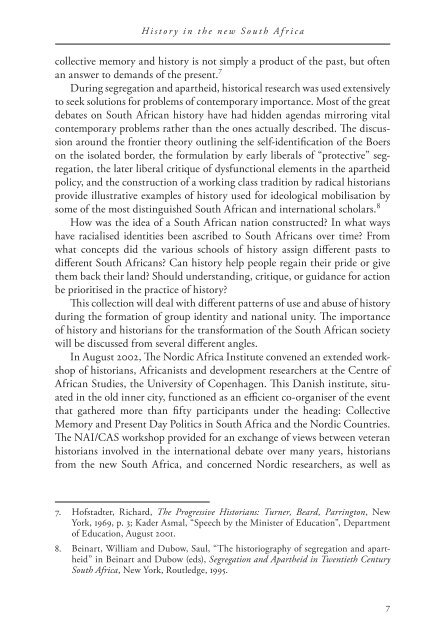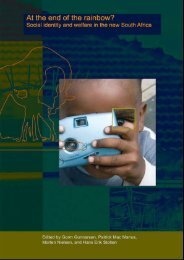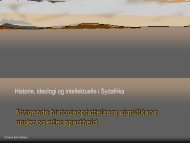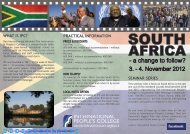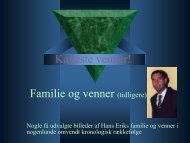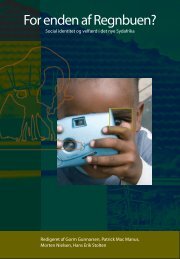History Making and Present Day Politics - Stolten's African Studies ...
History Making and Present Day Politics - Stolten's African Studies ...
History Making and Present Day Politics - Stolten's African Studies ...
You also want an ePaper? Increase the reach of your titles
YUMPU automatically turns print PDFs into web optimized ePapers that Google loves.
H i s t o r y i n t h e n e w S o u t h A f r i c a<br />
collective memory <strong>and</strong> history is not simply a product of the past, but often<br />
an answer to dem<strong>and</strong>s of the present. <br />
During segregation <strong>and</strong> apartheid, historical research was used extensively<br />
to seek solutions for problems of contemporary importance. Most of the great<br />
debates on South <strong>African</strong> history have had hidden agendas mirroring vital<br />
contemporary problems rather than the ones actually described. The discussion<br />
around the frontier theory outlining the self-identification of the Boers<br />
on the isolated border, the formulation by early liberals of “protective” segregation,<br />
the later liberal critique of dysfunctional elements in the apartheid<br />
policy, <strong>and</strong> the construction of a working class tradition by radical historians<br />
provide illustrative examples of history used for ideological mobilisation by<br />
some of the most distinguished South <strong>African</strong> <strong>and</strong> international scholars. <br />
How was the idea of a South <strong>African</strong> nation constructed? In what ways<br />
have racialised identities been ascribed to South <strong>African</strong>s over time? From<br />
what concepts did the various schools of history assign different pasts to<br />
different South <strong>African</strong>s? Can history help people regain their pride or give<br />
them back their l<strong>and</strong>? Should underst<strong>and</strong>ing, critique, or guidance for action<br />
be prioritised in the practice of history?<br />
This collection will deal with different patterns of use <strong>and</strong> abuse of history<br />
during the formation of group identity <strong>and</strong> national unity. The importance<br />
of history <strong>and</strong> historians for the transformation of the South <strong>African</strong> society<br />
will be discussed from several different angles.<br />
In August 2002, The Nordic Africa Institute convened an extended workshop<br />
of historians, <strong>African</strong>ists <strong>and</strong> development researchers at the Centre of<br />
<strong>African</strong> <strong>Studies</strong>, the University of Copenhagen. This Danish institute, situated<br />
in the old inner city, functioned as an efficient co-organiser of the event<br />
that gathered more than fifty participants under the heading: Collective<br />
Memory <strong>and</strong> <strong>Present</strong> <strong>Day</strong> <strong>Politics</strong> in South Africa <strong>and</strong> the Nordic Countries.<br />
The NAI/CAS workshop provided for an exchange of views between veteran<br />
historians involved in the international debate over many years, historians<br />
from the new South Africa, <strong>and</strong> concerned Nordic researchers, as well as<br />
. Hofstadter, Richard, The Progressive Historians: Turner, Beard, Parrington, New<br />
York, 1969, p. 3; Kader Asmal, “Speech by the Minister of Education”, Department<br />
of Education, August 2001.<br />
. Beinart, William <strong>and</strong> Dubow, Saul, “The historiography of segregation <strong>and</strong> apartheid”<br />
in Beinart <strong>and</strong> Dubow (eds), Segregation <strong>and</strong> Apartheid in Twentieth Century<br />
South Africa, New York, Routledge, 1995.


